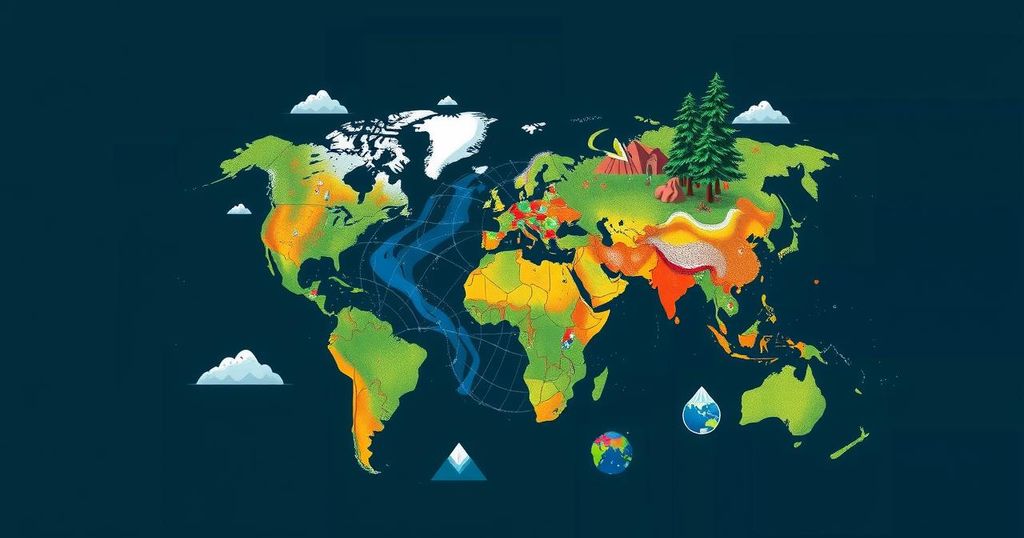The 29th UN Climate Change Conference (COP29), scheduled for November 11-22 in Baku, Azerbaijan, confronts significant challenges amid global conflicts and economic tensions. As developed nations grapple with funding commitments, the conference aims to address financial frameworks for climate action while facing skepticism due to Azerbaijan’s political landscape and the recent U.S. election. Despite these hurdles, COP29’s role as a diplomatic forum remains crucial for fostering international climate cooperation and driving policy change.
The upcoming 29th UN Climate Change Conference (COP29), set to take place in Baku, Azerbaijan from November 11 to 22, takes place in a context marked by rising global tensions and crises. As conflicts in Ukraine and the Middle East continue, and amid economic strain, the road to achieving significant climate agreements appears fraught with challenges. This year’s conference follows COP28 in Dubai, where some progress was made, yet Azerbaijan’s experience in climate diplomacy and rising calls for boycott complicate the landscape. The focus of COP29 will be on securing financial commitments between developed and developing countries, specifically in relation to climate financing—a contentious issue historically. While developed nations had promised $100 billion annually for climate efforts from 2020 to 2025, this commitment was met with delays. COP29 aims not only to address these past failures but also to consider future financial frameworks expected to exceed initial objectives, as developing countries urgently seek financial support in the face of dire climate impacts. Despite current geopolitical tensions, COP conferences have historically functioned as platforms for climate diplomacy. These forums allow for negotiations focused narrowly on climate issues, enabling diverse stakeholders—from developing nations to major powers—to engage in technical discussions. However, the increasing influences of global conflicts and domestic issues may hinder these negotiations. Political dynamics within key countries, especially with the recent U.S. election outcome, introduce additional uncertainties. Concerns prevail over reduced U.S. funding commitments under the anticipated Trump administration, alongside the potential strain between the European Union and China in leading discussions in these high-stakes negotiations. The cumulative challenges of finance, geopolitical tensions, and domestic crises raise questions about the efficacy of COP29 in producing substantial outcomes. Yet despite historical underachievement, these conferences continue to play a crucial role in shaping international climate policy and fostering global collaboration. The legacy of COP conferences may be defined less by their immediate outcomes and more by the continuous pressure they exert on nations to enhance climate action moving forward.
The COP29 conference arrives at a time when global stability is compromised by ongoing conflicts and economic uncertainty. The bifurcation of international relations, highlighted by the resurgence of the Trump administration in the U.S. and its impact on international funding, poses significant challenges for negotiations. The previous conference in Dubai reveals the complexities involved, particularly with the host nation’s reliance on oil and gas, further complicating discussions on transitioning away from fossil fuels. Financial commitments remain at the crux of negotiations, with developed countries historically failing to meet their climate funding promises. The urgency of the 2025 deadline for national climate pledges, as mandated by the Paris Agreement, is also a critical backdrop, emphasizing the need for cohesive climate action at this conference.
In summary, COP29 faces a daunting landscape characterized by geopolitical tensions, historical funding inadequacies, and domestic political strife. While the potential for meaningful agreements exists, reliance on the resilience of climate diplomacy and the equitable commitment from developed nations is paramount. The outcomes of COP29 may well hinge on the ability to navigate these intertwined crises and negotiate effectively amidst a backdrop of uncertainty.
Original Source: international.la-croix.com






